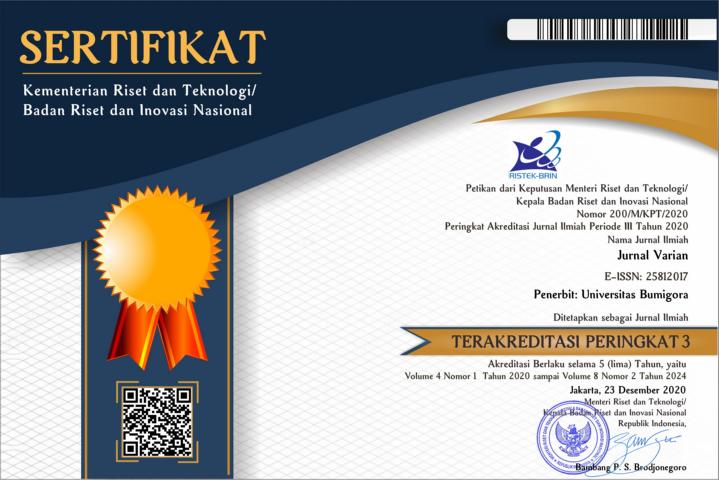A Kernel Logistic Regression Approach to Understanding the “Banyak Anak Banyak Rezeki” Stigma
Abstract
Indonesia, the world’s 4th largest country with a population of 270 million in 2020, faces many challenges due to rapid population growth, including biodiversity loss and increased consumption of natural
resources. One of the cultural factors underlying the high rate of population growth is the perception of
“Banyak Anak Banyak Rezeki“ that develops in the community. This study aims to identify and model
the factors that influence the “Banyak Anak Banyak Rezeki” stigma and find solutions to overcome this
problem. The research method used was quantitative, with a sample of 384 people in South Sulawesi,
consisting of Bugis, Makassar, Toraja, and Mandar tribes. The variables studied include religiosity,
tradition, number of children, and cognitive dissonance. The analysis techniques used were logistic
regression (LR) and kernel logistic regression (KLR). The results showed that religiosity, number of
children, and cognitive dissonance had a significant effect on the “Banyak Anak Banyak Rezeki” stigma.
The accuracy of the LR model reached 87.01% and increased to 93.51% after using KLR.
References
socio-cultural factors influencing contraceptive use in two Muslim communities in Kenya. Reproductive Health, 17(1),
44. https://doi.org/10.1186/s12978-020-0898-z
Akhirul, A., Witra, Y., Umar, I., & Erianjoni, E. (2020). Dampak Negatif Pertumbuhan Penduduk terhadap Lingkungan dan Upaya
Mengatasinya. Jurnal Kependudukan dan Pembangunan Lingkungan, 1(3), 76–84. http://jkpl.ppj.unp.ac.id/index.php/
JKPL/article/view/82
Al-Aamri, A., Taha, K., Maalouf, M., Kudlicki, A., & Homouz, D. (2020). Inferring Causation in Yeast Gene Association Networks
With Kernel Logistic Regression. Evolutionary Bioinformatics, 16, 1–6. https://doi.org/10.1177/1176934320920310
Annas, S., Poerwanto, B., Aswi, A., Abdy, M., & Fa’rifah, R. Y. (2022). Classification model for type of stroke using kernel logistic
regression. Communications in Mathematical Biology and Neuroscience, 2022, 1–17. https://doi.org/10.28919/cmbn/
7752
Astika, I. B. P., & Dwirandra, A. (2018). Whistleblowing Intention and Professional Skeptism in Moderating the Effect of Fraud
Audit Training and Audit Tenure on Fraud Detection Capabilities. Research Journal of Finance and Accounting, 9(21),
74–84. https://iiste.org/Journals/index.php/RJFA/article/view/45356
Badan Pusat Statistik Sulawesi. (2023). Tingkat Pengangguran Terbuka 2021-2023. Badan Pusat Statistik Sulawesi. https://sulsel.
bps.go.id/id/statistics-table/2/NDY2IzI=/tingkat-pengangguran-terbuka.html
Cafaro, P., Hansson, P., & Gotmark, F. (2022). Overpopulation is a major cause of biodiversity loss and smaller human populations are ¨
necessary to preserve what is left. Biological Conservation, 272, 109646. https://doi.org/10.1016/j.biocon.2022.109646
Cahyarini, H. A., Wijayanti, T., & Wiyoko, P. F. (2021). Hubungan Dukungan Suami terhadap Penggunaan Alat Kontrasepsi IUD
dalam Tinjauan Literature Review. Jurnal Indonesia Sosial Sains, 2(10), 1704–1729. https://doi.org/10.59141/jiss.v2i10.
437
Dewi, D. M. (2016). “Banyak Anak Banyak Rejeki” vs “Dua Anak Cukup” via Program KB di Kota Batam. Journal of Law and
Policy Transformation, 1(1), 94–122. Retrieved November 23, 2024, from https://journal.uib.ac.id/index.php/jlpt/article/
view/41
Hagevi, M. (2014). Religion and the environmental opinion in 22 countries: A comparative study. International Review of Sociology, 24(1), 91–109. https://doi.org/10.1080/03906701.2014.894333
Hatibie, I. K., & Priyambodo, T. K. (2020). Nilai historis pada makanan tradisional tiliaya dalam konteks kebudayaan Gorontalo.
Tulisan Ilmiah Pariwisata (TULIP), 2(1), 29–42. https://journal.umgo.ac.id/index.php/Tulip/article/view/575
Khraim, H. (2020). An exploratory study on factors associated with consumers’ post-purchase dissonance of electric vehicles. Innovative Marketing, 16(4), 13–23. https://doi.org/10.21511/im.16(4).2020.02
Marikyan, D., Papagiannidis, S., & Alamanos, E. (2023). Cognitive Dissonance in Technology Adoption: A Study of Smart Home
Users. Information Systems Frontiers, 25(3), 1101–1123. https://doi.org/10.1007/s10796-020-10042-3
Mart´ın-Baos, J. A., Garc ´ ´ıa-Rodenas, R., & Rodriguez-Benitez, L. (2021). A Python package for performing penalized maximum ´
likelihood estimation of conditional logit models using Kernel Logistic Regression. Transportation Research Procedia,
58, 61–68. https://doi.org/10.1016/j.trpro.2021.11.009
Nusinovici, S., Tham, Y. C., Chak Yan, M. Y., Wei Ting, D. S., Li, J., Sabanayagam, C., Wong, T. Y., & Cheng, C.-Y. (2020). Logistic
regression was as good as machine learning for predicting major chronic diseases. Journal of Clinical Epidemiology,
122, 56–69. https://doi.org/10.1016/j.jclinepi.2020.03.002
Samsi, S. N., Rufaridah, A., Marlia, S., Dahlan, A., Komalasari, W., & Husni, L. (2023). Edukasi Pendidikan Kesehatan Pada Pasangan Usia Subur Dalam Pemilihan Kontrasepsi. Jurnal Abdi Kesehatan dan Kedokteran, 2(1), 74–83. https://doi.org/10.
55018/jakk.v2i1.30
Sprocha, B., & Tisliar, P. (2019). Fertility and Religious Belief: Old and New Relationships in Slovakia. Journal for the Study of
Religions and Ideologies, 18(52), 63–79. Retrieved November 23, 2024, from https://jsri.ro/ojs/index.php/jsri/article/
view/1039
Wahab, A. (2022). Pengaruh Pertumbuhan Penduduk, Upah, dan Inflasi Terhadap Pertumbuhan Ekonomi dan Tingkat Pengangguran
Terbuka di Sulawesi Selatan. Jurnal Ekonomi Pembangunan STIE Muhammadiyah Palopo, 8(2), 168. https://doi.org/
10.35906/jep.v8i2.1149
Wardhana, A. P. S. (2017). Pahlawan yang Terlupakan: Kader Keluarga Berencana (KB) dalam Politik Seksualitas di Surakarta
(1973-1998). Jurnal Perempuan, 22(2), 119–128.

This work is licensed under a Creative Commons Attribution 4.0 International License.


















